May 21, 2025 | 04:35 GMT +7
May 21, 2025 | 04:35 GMT +7
Hotline: 0913.378.918
May 21, 2025 | 04:35 GMT +7
Hotline: 0913.378.918
According to Mr. Tran Van Phuc, Director of Binh Dinh province's Department of Agriculture and Rural Development, the local government recently issued a procedure for controlling and managing plastic waste on fishing vessels during sea voyages for local fishermen.
Accordingly, Binh Dinh province aims to, by 2030, provide training for all of its on-duty fishermen on managing and minimizing ocean plastic waste; mobilize the entirety of its seafood harvesting vessel fleet to transport plastic waste, including both household and industrial waste, from fishing vessels to shore. Consequently, the collected waste will be delivered to collection centers at fishing ports, and subsequently transferred to relevant processing units.
On the other hand, all fishing ports in Binh Dinh province need to organize the collection and sorting of plastic waste from fishing vessels, and transfer them to relevant processing units for disposal. Additionally, they must aim to enhance and synchronize the database on ocean plastic waste from fishing vessels.
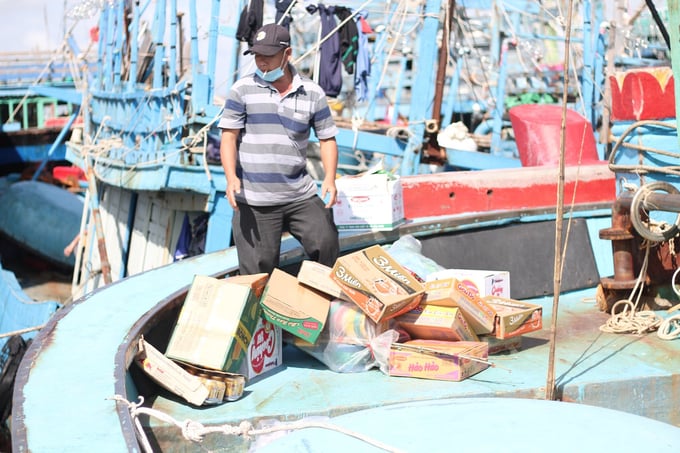
Fishermen's activities during sea voyages result in a multitude of waste types. Photo: V.D.T.
"This regulation will apply to owners, captains, and crew members of fishing vessels with a length of at least 15 meters when participating in offshore seafood harvesting activities, as well as to units and organizations responsible for managing and controlling ocean plastic waste at the Quy Nhon, De Gi, and Tam Quan fishing ports. The local government also encourages the application of this procedure to fishing vessels with a length of 12 meters to under 15 meters when engaging in offshore fishing activities," Mr. Phuc stated.
According to Mr. Phuc, Binh Dinh province's Department of Agriculture and Rural Development has requested the Management Boards of Quy Nhon, De Gi, and Tam Quan fishing ports to establish collection centers for plastic waste at the fishing ports. They are also tasked with forming teams to collect waste generated from fishing vessels by utilizing manpower from the port's environmental sanitation teams. Furthermore, they must maintain the organized collection and sorting of plastic waste generated from fishing vessels, and its subsequent transfer to purchasing and recycling facilities.
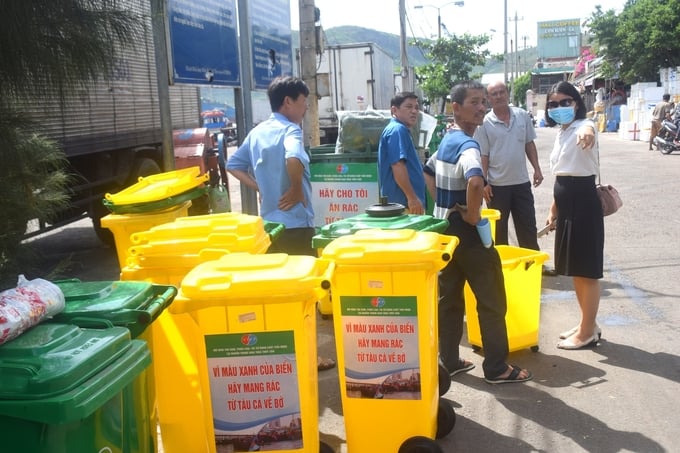
Quy Nhon fishing port in Binh Dinh province organizing the collection of waste from fishing vessels for disposal on shore. Photo: V.D.T.
According to Mr. Nguyen Huu Nghia, Director of Binh Dinh province's Sub-Department of Fisheries, the agency will collaborate with coastal communes and wards to strengthen communication efforts and enhance coordination, management, and supervision of local owners and captains of fishing vessels to ensure compliance with regulations regarding the collection and disposal of solid waste on fishing vessels upon returning to shore after each voyage.
"The effective implementation of procedures for controlling and managing ocean plastic waste generated from fishing vessels will help minimize plastic waste in seafood harvesting activities, thereby gradually increasing control over ocean plastic waste at its source, with an emphasis on the circular economy and a sustainable development model. Additionally, the procedures will raise awareness among the fishing community and seafood businesses. This aims to contribute to the successful implementation of the Action Plan for the Management of Ocean Plastic Waste in the Fisheries Sector from 2020 to 2030, and the Action Plan for the Management of Ocean Plastic Waste until 2030 in Binh Dinh province," Mr. Nguyen Huu Nghia shared.
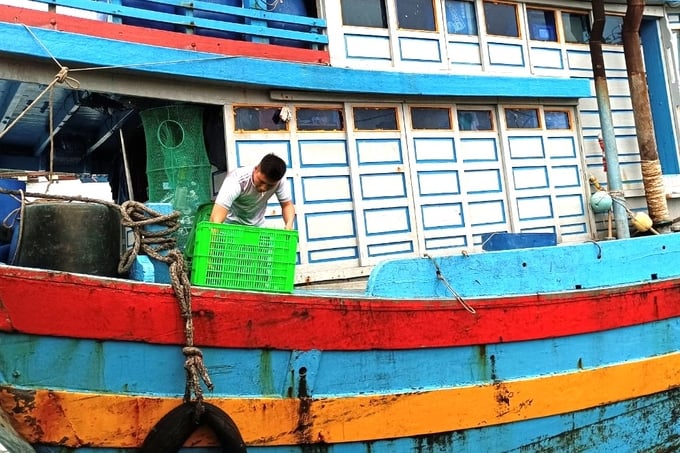
Fishermen in Binh Dinh province have been conscientiously collecting household waste during their sea voyages for disposal ashore. Photo: V.D.T.
Binh Dinh is one of the leading provinces nationwide in terms of fishing vessel fleet size, with 5,969 vessels and a total capacity of 1.99 million CV. Notably, there are 3,260 high-capacity vessels specializing in offshore fishing, with a total of 41,928 fishermen employed. Seafood harvesting is a key economic sector in Binh Dinh province, with an annual yield of 260,000 tons of various seafood types, and a production value of nearly 16,000 billion Vietnamese dong. Consequently, the waste generated from the production and daily activities of fishing vessels in Binh Dinh province has been polluting the marine environment, exacerbating the issue of waste accumulation.
According to Mr. Tran Van Vinh, Deputy Director of Binh Dinh province's Department of Fisheries, with the aim of raising awareness for the marine environment, the local government has conducted multiple surveys on the amount of waste discharged into the ocean from fishing vessels during each voyage, as well as the amount of waste at fishing ports after each voyage. The survey results have revealed an alarming level of waste.
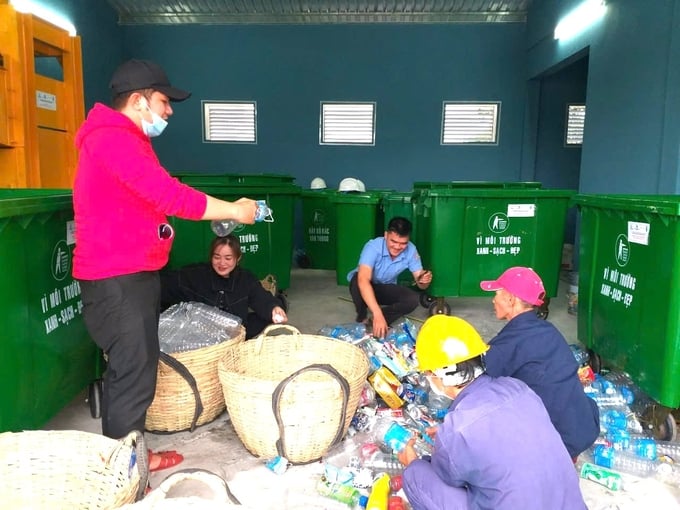
Waste sorting at Quy Nhon fishing port in Binh Dinh province. Photo: V.D.T.
"The survey was conducted at Quy Nhon fishing port through direct interviews with vessel owners, captains, and businesses providing logistical services for fishing vessels at the port. During each voyage, a fishing vessel must carry a variety of beverages and food for the crew members, such as bottled drinks, beverages, rations, and food. Various packaging materials are also used to contain and preserve seafood products, in addition to damaged fishing gear," Mr. Vinh explained.
As a result, the local government has identified the sources of ocean solid waste generated from the daily activities of crew members during their fishing voyages, which are dumped into the sea during the harvesting process at fishing grounds. Packaging materials used to preserve and contain seafood products upon arrival at the fishing port are not collected by fishermen, but discarded on the port or into the waters of the fishing port.
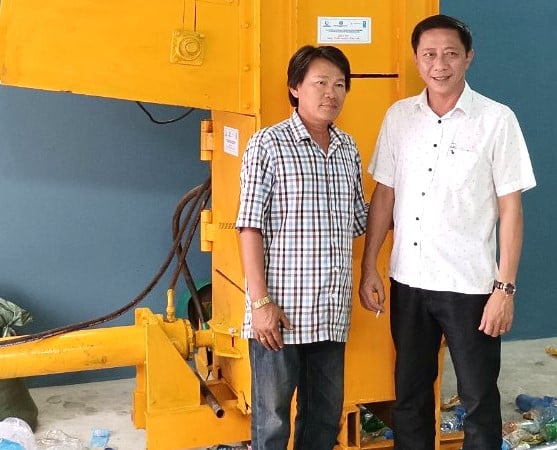
Mr. Dao Xuan Thien, Director of the Management Board of Binh Dinh fishing port (right), in front of a trash compactor installed at Quy Nhon fishing port. Photo: V.D.T.
"The survey revealed that for every 10 fishing vessels, the amount of waste discharged into the fishing grounds from the crew's daily activities during a single voyage was staggering. Plastic bottles alone accounted for over 138 kilograms, aluminum cans nearly 29 kilograms, and the plastic packaging used to contain and preserve seafood products on the fishing vessels amounted to over 58 kilograms. Consequently, for every 300 fishing vessels docked at Quy Nhon fishing port per month after a voyage, the plastic waste discharged into the ocean totals over 4 tons, with aluminum cans reaching 0.86 tons. After docking, an additional 1.75 tons of plastic packaging used for seafood products is discharged," Mr. Tran Van Vinh shared.
Mr. Vinh emphasized: "It is time for fishermen to realize that if a polluted marine environment will lead to a decline in seafood resources. Moreover, when international markets cease purchasing seafood caught in polluted waters, fishermen will be the first to suffer the consequences."
Binh Dinh province has developed and issued regulations on the management, collection, and disposal of household waste on fishing vessels and at fishing ports, with the primary beneficiary being the local fishermen. The local government will strengthen inspection activities and address violations by fishing vessels that fail to comply with regulations on plastic waste management upon entry and exit from fishing ports, as well as vessels that fail to adhere to the model of collecting plastic waste from fishing vessels at designated collection centers within the fishing port area, thereby promoting circular economic practices," added Mr. Tran Van Vinh.
Translated by Nguyen Hai Long

(VAN) In 2024, over 295 million people across 53 countries and territories faced acute hunger—an increase of almost 14 million people compared to 2023, while the number of people facing catastrophic levels of hunger reached a record high.

(VAN) World Environment Day 2025 (June 5) carries the theme 'Beat Plastic Pollution' continuing to emphasize the global urgency of addressing the plastic waste crisis.

(VAN) This was the assessment shared by experts at the workshop titled 'Assessing the Role and Potential of Low-Emission Rice Production Systems in Vietnam,' held on the morning of May 19.

(VAN) Cai Rong Port is the fisheries control center of Quang Ninh, helping to monitor fishing vessels, combat IUU fishing, and remove the EC's 'yellow card'.

(VAN) The German Agricultural Society (DLG) explores the possibility of establishing a mechanization service center in Vietnam’s Mekong Delta to support farmers in accessing and utilizing advanced machinery.

(VAN) On May 16, the Department of Water Resources Management, in collaboration with the Food and Agriculture Organization of the United Nations (FAO), held a signing ceremony for the GEF-8 project document.

(VAN) Food safety, mechanization, vocational training, and market opening are key areas of cooperation expected between the Vietnamese Government and the Federal Republic of Germany.